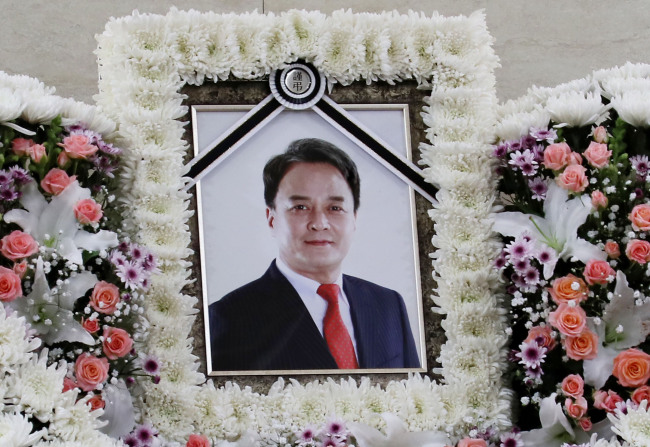With actor Jo Min-ki’s abrupt death on Friday amid accusations he had sexually assaulted eight women, the #MeToo movement faces yet another challenge: dealing with those who blame the campaign for Jo’s apparent suicide and the “damages suffered” by other accused men.
Jo, who was due to be questioned by police Monday, was found dead in the basement of the residential and office building in Seoul where he lived. Prior to his death, he was fired from his position as a drama professor at Cheongju University after allegations of rape and sexual harassment of students came to light. He was one of the high-profile figures accused of sexual assault amid the belated but fast spread of the local #MeToo movement.
With Jo’s death, however, the movement is being attacked, with some calling it a witch hunt or even “misandry.”
 |
Late actor Jo Min-ki`s photograph is displayed at the site of his funeral in Seoul. (Yonhap) |
At the same time, the movement’s supporters, including women’s rights activists, have called for the arrest of those who face questioning by the prosecution or police on charges of sexual misconduct. Some have also taken to a hashtag saying “Jo Min-ki was killed by Jo Min-ki himself.”
The hashtag was emerged after an online petition was filed on the Presidential Office’s website Friday requesting the president attend the late actor’s funeral. In February, President Moon Jae-in openly endorsed and expressed his support for the #MeToo campaign, calling on judicial agencies and all relevant government bodies to actively investigate allegations of sexual abuse.
The online petition criticizes Moon for endorsing the campaign. The petition reads, “Because of your words (of endorsement), the life of Jo Min-ki has been lost.”
“You should have been more careful before participating in the #MeToo movement,” the petition, which directly writes to the President, continues. “You should attend Jo’s funeral. He, too, is a citizen of South Korea.”
Also on Friday, actor Yoo Ah-in’s Instagram post, showing what appears to be film footage of people being burned at the stake in medieval Europe, created a storm of controversy. The post, without any written explanation and, unlike his other posts, closed for comments, has been received by many as a way to insult the ongoing #MeToo movement.
Yoo has been severely criticized by feminist writers and activists in the past for online remarks concerning women, especially those that condemned certain female activists for their “radical” and “violent” approach. Ironically, he says he is a self-proclaimed feminist.
Some, including film critic Djuna and author Yun Dan-woo, have boycotted Yoo’s movies following the controversy.
“You did not write a single word when the #MeToo movement was in full momentum, and now (that Jo is dead) you are posting footage that is reminiscent of a witch hunt,” author Baek Ga-hee wrote on another of Yoo‘s Instagram posts.
“Even some (non-feminist) men in this country understand the meaning and context of the #MeToo movement. But it seems like you, a self-proclaimed feminist, do not understand these at all. And it seems like you don’t even understand the history of the witch hunt, which was a form of gender-based violence that sacrificed many innocent women’s lives. The fact that you used this footage to support the late aggressor, while ignoring the historical context of the witch hunt, is absolutely horrendous.”
In response to attacks against the #MeToo movement that claim Jo was “killed by the #MeToo movement,” the hashtag “Jo Min-ki was killed by Jo Min-ki himself” emerged.
“To claim that Jo Min-ki was killed by the #MeToo movement is to claim that Hitler was killed by the Holocaust victims,” said one Twitter user, using the hashtag.
“He destroyed his own life and we will not stop our movement,” said another, also using the hashtag. “Stop saying that we should discontinue the #MeToo movement. Instead, stop sexually assaulting women.”
Others have called for the arrest of those who face questioning by the prosecution or police for charges of sexual misconduct, to prevent the suicides of the accused as well as secondary victimization of alleged victims -- which became reality after Jo’s death.
The Facebook account of one of the alleged victims of Jo’s sexual assault has been filled with malicious comments since Jo’s death. Many of these comments claimed the victim was responsible for Jo’s death, saying she should have filed a legal complaint against him first instead of making her allegations online.
Some point out that South Korea has been rather indifferent towards deaths of victims of sexual and domestic violence in the past, and that Jo’s death is receiving more attention than those who died in silence.
Last year, it was reported that victims of “revenge porn” or spy cameras often take their own lives, citing a representative of an organization that deletes such footage from cyberspace at the request of the victims.
“People did not say much when victims of spy cameras took their own lives, when the number of women killed by their boyfriends or wives daily are reported,” Yang Pa, a feminist writer, wrote in a Facebook post.
“And now people are showing their condolences to the late aggressor, (by attacking the victims).”
By Claire Lee (
dyc@heraldcorp.com)







![[Today’s K-pop] Blackpink’s Jennie, Lisa invited to Coachella as solo acts](http://res.heraldm.com/phpwas/restmb_idxmake.php?idx=644&simg=/content/image/2024/11/21/20241121050099_0.jpg)
